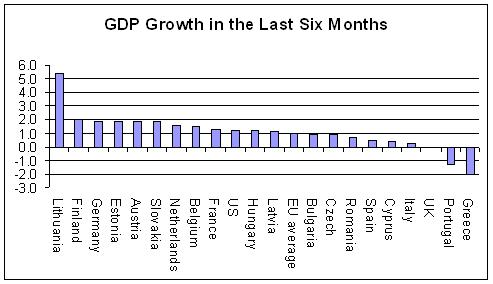In the briefest of interviews on the question of the nation’s debt on Radio 5 Live yesterday – squeezed in between sessions on the FA Cup Final – I challenged Guido Fawkes , aka Paul Staines.
The government, I argued, cannot cut the deficit. For this reason it was sad, but also comical to see an obviously intelligent fellow like Mr Staines and 350 demonstrators tilting at the coalition government’s windmill.
Both Phil the interviewer, and Mr Staines were (apparently) taken aback at this simple statement of economic reality, but I had little chance to explain, as the conversation moved on to speculation about Stoke City, and whether strikers could net the ball that day.
So let me spell out the argument again. The government cannot cut the deficit. Here’s why:
The size of the budgetary outcome depends on the plans of the entire economic system and its reactions to the government’s planned actions. The budget therefore, cannot be taken in isolation, as Prof Chick and I argued in a letter to the Financial Times on 4 October, 2010.
The government’s budget is part of the national economic cake, otherwise defined as GDP. When the ‘cake’ sinks, and a great hole appears in the middle of it, the deficit, and the debt rises. When the ‘cake’ rises – the deficit and the debt falls – regardless of actions by Chancellors of the Exchequer.
The evidence of this is in the recent GDP numbers. The figures showed that Britain, despite being the ‘poster-boy’ of deficit-cutters’ in the US’s Tea Party and in the EU, had fallen well behind her peers in other OECD countries – as Duncan Weldon’s chart below, shows. Indeed we are now in the ‘dunce’s corner’, together with Greece and Portugal.
This comes about because Britain has had a ‘hole’ – or even a ‘crater’ – blown out of its national cake by the financial crisis – and the government is exacerbating the crisis by digging an even bigger hole ….. and cutting back the budget.
The task of the Chancellor is not just to focus narrowly on the government’s budget, but on the economy as a whole, including the private sector. His task, nay grave responsibility, is to ‘bake the economy’s cake’ in a way that will compensate for the economic inactivity caused by the financial crisis (2.5 million unemployed; rising insolvencies, and economic inertia caused by very high levels of individual/household/corporate debt).
It is the financial crisis and economic inactivity that has caused government debt to rise (as tax revenues fell, and welfare benefit payments rose). The government should simply face this reality. The remedy is for government to act: to kick-start the private sector by investment in sound, sustainable projects that will spin off jobs, both in the public but also the private sectors. The Chancellor’s economic cake should be as scientific in its preparation as a Delia Smith cake – and not be ‘cooked’ on the basis of popular or populist mythology; on the basis of bank-lobbying. Or indeed, ideology.
The ‘rally against the debt’ and its supporters are part of a conversation that sets up, as we argued in the FT:
“false dichotomies: between cutters and postponers; between deficit-cutting and stimulus. The debate is not between these but between expenditure-cutting and stimulus.
“While we agree there should be a “plan to cut the deficit”, the question raised is whether expenditure-cutting (and tax-raising) will actually result in a reduction in the deficit or an increase? Our research (in a paper entitled ‘The Economic consequences of Mr Osborne’) shows, using UK data from 1918 to 2009, that a persistent expenditure cut was correlated with a rise in the debt/gross domestic product ratio; and expansions in expenditure with a fall in debt/GDP.
” Since the deficit is not something that government can control, setting out to reduce the deficit is to look at the problem through the wrong end of a telescope: the way to reduce a deficit in a time of unemployment and feeble recovery is to spend (preferably wisely) to promote employment and permanent improvements to our infrastructure, including our “human capital”.
“Keynes looked through the telescope the right way round: “Look after the unemployment, and the budget will look after itself.”
In other words, Chancellor, bake the economic cake in a way that increases investment and jobs – and hey presto, the deficit – and the debt – will fall.




I have heard Vince Cable, an erstwhile Keynsian, claim that Keynes had nothing to say about a potential failure of the banks, the particular issue (he said) in this crisis. How do you respond?
Best wishes
The problem with this critique is that it assumes the govt simply doesn’t understand how the economy works. But it’s not feasible that the Chancellor really believes ‘expansionary austerity’ is likely to produce growth.
The truth is that the deficit represents too good an opportunity to dismantle and sell off the public sector and cut benefits. A bit of short term pain for, in their eyes, the long-term gain of a neo-liberal, small-state future.
James, thanks for this. I would respond in this way:Keynes’s great work, the General Theory was written solely as a response to the failure of the financial system 1929-33…and proposed an economic framework that would prevent bank failures. He did not think there was much point in devising theories/strategies for rescuing failed banks; that was to design for failure. Rather he designed for stability and recovery: invested his intellectual energy in devising an economic theory/framework whose purpose was to prevent such bank failures. Sadly, those theories were deliberately abandoned by economists prey to the lobbying of bankers – back in the 1960s and 70s. The result? Easy (de-regulated) credit creation by the private banking sector, at substantially higher rates of interest than in the Keynesian ‘Golden Age’ of 1945-71.
Good for bankers in the short-term; but increasingly led to financial crises in the medium and long-term. After 1971, too much credit chasing too few goods in services inflated price and asset bubbles…for which Keynes and ‘Keynesianism’ was then blamed!
So I declare Vince Cable wholly wrong on this point.
Yes indeed. Ann, do you think we can phase out the debt over a period of time, without any cuts, if we implement the reforms of positivemoney.org? In essence, legislate to replace fractional with full reserve banking. New money would be created by the state/independent body, issued into the economy interest free (less inflationary than issuing credit)? Or have I got this wrong?
Pingback: Balls walks straight into Cameron's trap | Left Foot Forward
Just seen this.
Are you aware that if a business hires a welder, that welder must contribute more value than he is paid in order to have a positive effect on GDP?
Are you also aware that hiring a public sector employee allows for his or her salary to be counted as a net contribution to GDP irrespective of any value they create?
Cutting public spending will cut GDP because of the looking-glass accounting model they use.
Tom Donnely:
You’re mistaken in thinking that the incompetent welders’ wages are not counted in GDP. If that were true the past decade’s worth of Wall street wages and bonuses would have to be struck off the books. Seriously. Wages and Benefits are counted as part of GDP, even for a failing business. Not to mention that there is not an objective way to value the contribution of a single worker in a complex firm that may or may not be earning money as a whole.
I’m not sure why you think that public sector workers should be treated any differently.
“bake the economic cake in a way that increases investment and jobs – and hey presto, the deficit – and the debt – will fall.”
Please explain why this did not work despite G.Brown doing it for 13 years in far more benign conditions.